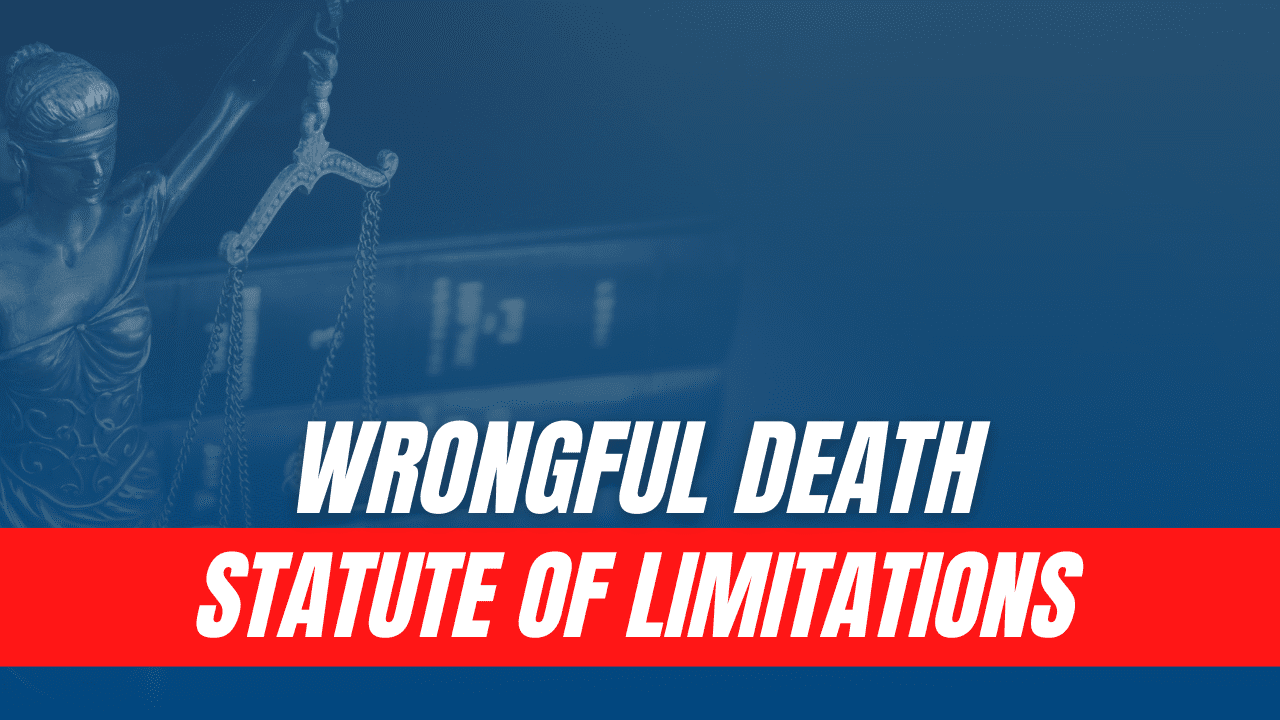
Navigating the Time Limits: Understanding the Wrongful Death Statute of Limitations in Florida
When faced with the tragic event of a loved one’s wrongful death in Florida, it’s crucial to understand that you have precisely two years from the date of death to file a lawsuit. Our comprehensive article demystifies the wrongful death statute of limitations in Florida, helping you grasp the nuances that could extend or affect this period and supporting you in taking the necessary legal steps during such a challenging time.
Key Takeaways
- In Florida, wrongful death lawsuits have a two-year statute of limitations starting from the date of death, but exceptions can extend this period, especially in cases of fraud, minors, or mental incapacity.
- Filing a wrongful death claim against a government entity in Florida requires additional steps like a written notice and comes with recovery limitations, such as a cap on damages and attorney fees.
- A wrongful death claim in Florida can include both economic and non-economic damages, and is filed by the personal representative of the deceased, benefiting the estate and survivors.
Deciphering the Statute of Limitations for Wrongful Death in Florida

In Florida, the period to file a wrongful death lawsuit spans two years from the date of the deceased’s demise, as dictated by the Florida wrongful death statute. This means you have two years to file a lawsuit seeking justice and financial compensation for the loss of a loved one. These lawsuits can be filed on grounds of:
- negligence
- default
- breach of contract
- warranty, including incidents occurring on navigable waters.
Nonetheless, the two-year time frame is not as clear-cut as it appears. Certain circumstances and exceptions can affect this time limit. Understanding these nuances can be the difference between successfully filing a lawsuit and missing your opportunity to seek justice.
Additionally, bear in mind that wrongful death claims are civil lawsuits, separate from any potential criminal charges related to the death. This means that even if a criminal case is underway, the statute of limitations for the wrongful death civil lawsuit continues to run.
Critical Start Date for the Clock
The clock starts ticking on the date of the victim’s death, not the date of the incident causing the death. This distinction is critical because it means that even if the incident occurred more than two years ago, you might still have time to file a wrongful death lawsuit if the victim died more recently.
As the wrongful death statute commences on the date of death, it is recommended to promptly consult a wrongful death attorney to maintain the right to file a claim. Every day that passes is one day closer to the deadline, and you don’t want to find yourself running out of time to seek justice for your loved one.
Implications for Medical Malpractice Claims
Wrongful death claims due to medical malpractice operate under their own set of rules. While they are also subject to a two-year statute of limitations, there’s a maximum limit of four years from the date of the incident, regardless of when the incident was discovered. This provision reflects the reality that the effects of medical malpractice may not be immediately apparent.
These claims, however, can be convoluted due to potential exceptions, exclusions, and limits that may come into play. Hence, it becomes paramount to seek advice from a competent attorney who can navigate you through the complexities of medical malpractice wrongful death claims.
Filing Against Government Entities: Special Considerations
When the defendant in a wrongful death claim is a government entity, there are unique procedures to follow. For instance, a written notice of the claim must be filed with both the responsible agency and the Department of Financial Services within two years after it accrues. The standard two-year statute of limitations may be extended by the time taken for the agency to review the claim.
There are also caps on the damages that can be recovered in wrongful death suits against government entities. These limits are set at $200,000 per person or $300,000 per incident, and attorney fees are restricted to 25 percent of any judgment or settlement. Punitive damages and pre-judgment interest are not recoverable.
Additionally, where you file your lawsuit depends on several factors, including where the incident occurred, where the relevant property is located, or where the agency conducts business. Government entities may be self-insured, participate in risk management programs, or purchase liability insurance, which can influence how wrongful death claims are resolved and compensated.
Identifying Exceptions to the Rule: When Limitations Extend
Under particular circumstances, the permissible time frame for filing a wrongful death lawsuit can exceed the standard two-year limit. One such scenario is when the discovery rule applies. This rule allows for an extension when an injury is discovered, or reasonably should have been discovered, which is particularly relevant in cases involving fraud.
The statute of limitations can also be extended for certain plaintiffs. For instance, it’s tolled for minor children until their eighth birthday and can be extended for plaintiffs who are mentally incapacitated, but not beyond seven years from the incident. Moreover, if the defendant resides out of state or is missing, the statute of limitations may be extended to allow for the legal process to be carried out.
In cases where the wrongful death results from murder or manslaughter, there is no death statute of limitations. This means a claim can be filed at any time, regardless of the status of criminal charges or convictions. Also, if the liable party for wrongful death passes away during the lawsuit, a plaintiff has 90 days to motion for the appointment of the deceased’s estate representative as the defendant to continue the case.
Initiating Your Wrongful Death Claim: Steps to Take

To commence a Florida wrongful death claim, the claim can be filed by the personal representative of the deceased’s estate, either designated in a will or appointed by the probate court, as per Florida’s Wrongful Death Act and the Florida Statute. This representative must identify and list all potential beneficiaries, including:
- spouses
- children
- parents
- dependent blood relatives
- adoptive siblings
The wrongful death lawsuit targets the individual responsible for the wrongful death case, which may involve wrongful acts, negligence, or a breach of contract or warranty. It’s important to note that this is irrespective of any separate criminal proceedings that may also be underway or other wrongful death lawsuits that might be filed.
Any damages recovered through the wrongful death lawsuit are for the benefit of the deceased person’s estate and for surviving family members. This means that the money awarded will go towards helping those left behind and the estate to recover from the financial loss caused by the wrongful death.
The Scope of Recoverable Damages: What You Can Claim
In Florida wrongful death cases, claimants can pursue two main categories of damages: economic and non-economic. Economic damages can include the deceased’s lost wages from the date of injury to death, their potential earnings until retirement, medical expenses incurred, and the value of services they would have provided.
Non-economic damages, on the other hand, encompass the intangible losses suffered by the survivors. These can include:
- the pain and suffering endured
- emotional trauma
- loss of companionship
- loss of protection
- loss of support
In cases of egregious wrongdoing, punitive damages may be sought. Additionally, creditors’ claims and contributions to the estate are also important factors influencing the recoverable amounts.
Seeking Legal Representation: The Role of a Wrongful Death Lawyer
Engaging a wrongful death attorney can extend indispensable assistance to the grieving family. While the family processes their grief, the lawyer can handle the complexities of their case. An experienced wrongful death attorney in Florida guides clients through intricate legal procedures, ensuring all necessary documentation is accurately completed and submitted.
Wrongful death attorneys can advocate for the estate and family of the deceased, using their skills and experience to ensure the best possible outcome for the case. Their expertise is particularly critical in negotiating with insurance companies and pursuing a fair settlement for the family.
If settlement negotiations are unsuccessful, wrongful death attorneys are prepared to go to court to seek just compensation for the family. Hence, it is vital to seek a consultation with a wrongful death attorney without delay after a loved one’s death in order to uphold the rights to seek justice and financial compensation.
Contact Our Florida Wrongful Death Lawyer Now
Navigating the wrongful death statute of limitations in Florida can be a complex process. Understanding the basics, such as the two-year limit and the date from which it starts, is critical. Knowing when the clock can be paused or extended, how to file a claim, what damages can be recovered, and the importance of legal representation can empower you to take the necessary steps towards justice.
Though the journey may be challenging, remember, you don’t have to face it alone. A knowledgeable wrongful death attorney can provide the support, guidance, and advocacy you need to navigate this legal maze. So, take that first step today and reach out for the help you need to seek justice for your loved one.



